Unusual union
The French bourgeois revolution of 1789, along with the formation of the North American United States, was one of the most notable events in the world. storiesthat caused at the end of the XVIII century. acute military-political confrontation. The cardinal change of the social order in France prompted all the ruling courts of Europe to form a coalition in order to restore the Bourbon dynasty to the throne of Versailles. But the republican troops, reflecting the first onslaught of the combined anti-French forces, crossed their borders in 1794 and turned to conquering Europe.
The brilliant Port, being a longtime ally of France, initially rather indifferently looked at the changes taking place there. But as the ideas of the French Revolution penetrated the Ottoman Empire, the Port began to be quite wary of the French and their innovations, fearing undesirable consequences in their possessions.
Emperor Pavel I, who entered the throne of Russia in November 1796, assessing the state of affairs in Europe, decided to rally with monarchical states and put a barrier to the spread of republican ideas, without using, however, his troops. In the rescript, to the ambassador extraordinary and authorized minister in Istanbul, V.P. Kochubei from 16 (27) of December 1796 he wrote: “In general affairs in this situation, when the fragile French rule of existence, and with not the most decisive warring forces against it, successes, believe all war among the most unknown. We will willingly agree to explain in a friendly way to the powers adhering to Us about everything that can help to end the disasters of the human race. From among the friendly powers of these countries, We and Ports will not take away, empowering you before the formal notice of Our accession to the throne, inform Ours in the Ports reasoning system ... making them feel that We are doing this not with a feat of weakness or fear, but peace and compassion for the people whom the Almighty entrusts the monarchs to rule to a good end, and not to donate to lust for power or the spirit of conquest. "
Emperor Paul I During the campaign of 1796-1797. French troops under the command of the young and energetic general Napoleon Bonaparte captured northern Italy and the islands of the Ionian archipelago, establishing republican rule there according to their own model. This circumstance further increased the Russian cabinet's concern for the fate of Europe.
Porte was also extremely unpleasant, "the revolution made by General Bonaparte during the Venetian rule," because the neighborhood in the Balkans with the French became dangerous for Porta.
The conquests of the French in Europe and their approach to their borders seriously disturbed the ruling circles of Turkey.
The negative attitude of the Turks towards the French grew. The famous Kapudan Pasha Hussein declared on this occasion to the Russian envoy that “the French are a nasty nation, who have reformed all the rules, lawless and dangerous so much for friends as well as their enemies.”
By the end of 1797, Kochubey cautiously, but quite frankly, instilled in the Turkish Ministry the idea of the danger of strengthening French rule in the Adriatic and the desire of Russia "to communicate with Porto about ways to avert further spread of evil." However, there was no certainty that the Turks, secretly agreeing with the French, would not send their squadrons to the Black Sea. In the protection of this 4 (15) in February 1798, Pavel I, by rescript Admiral N.S., Chairman of the Black Sea Admiralty Board. Mordvinov prescribed: “Although now we on the part of the Ottoman Porte do not see any destinations for breaking the world .., but since the French, having seized the shores and islands of the Republic of Venice adjacent to Turkey, would not have stirred the Turks to act against us, then why and it is prescribed to you ... to bring our fleets and our coast to safety, so that they may not surprise. "
Rescript from the same day and F.F. Ushakov was ordered to prepare the Black Sea Fleet in case of war with Turkey. And 6 (15) February 1798 was the highest approved by the full operational plan of a possible war with the Ottoman Porte.
In preparation for the worst, the Russian cabinet, meanwhile, hoped for the best. In conversations with Kapudan Pasha (the highest rank in navy in Sultan Turkey, corresponded to Admiral General. Kapudan Pasha was the commander of the fleet. - Ed.) And reiz-effendi (State Chancellor, Minister of Foreign Affairs in Turkey. - Ed.) Kochubey tried to convince them of Paul I’s peace-loving tendencies that he soon began to bear fruit.
Present at one of the conversations Dragoman (translator) Ports Prince K. Ypsilanti remarked:
- What difference is delivered to us to see in business with Russia. Before, every word of yours gave rise to distrust, but now this is one of the most powerful powers to us.
“The mutual connection between our empires can establish itself even more from day to day,” answered Viktor Pavlovich Kochubey, “so that a complete power of attorney is established between courts, between ministers and even among citizens altogether that hostility, which at one mention of the Russian name forced your people to run so that the government would not feel it for a spy or a traitor.
14 (25) April Kochubey left Istanbul, handing over the affairs of the plenipotentiary minister in the Ottoman capital to the secret adviser Vasily Stepanovich Tomar who arrived from St. Petersburg. The new Russian envoy, with no less zeal, undertook the creation of a coalition, helped by the preparations of the French fleet in Toulon and news from European newspapers about the latter’s intention to attack Egypt.
However, the possibility of the arrival of the French fleet in the Black Sea was not excluded. Therefore, 23 of April (4 of May) Pavel I pointed out to Vice Admiral Ushakov with his rescript: “As a result of this command from Us already (from 9 (20) of April. - Avt.) About leaving the fleet of the linear fleet at sea and taking a position between Sevastopol and Odessa, try to observe all movements from both Porta and the French, so that they would encroach on the Black Sea or incline Porto to any attempt. ”
Then the rescript was sent to VS Tomara ordered that “in the event of an increase or continuation of armaments, Porto should immediately notify them”. But the Port was more and more leaning towards an alliance with Russia. That is why Tomara 15 (26) of May (not yet knowing about the release of the Toulon fleet, which followed 8 (19) of May), having received two nominal decrees from St. Petersburg from 11 (22) of April, made Porte's idea of “readiness to use the Black Sea Fleet to strengthen Turkish forces "and the desire to do" with the Ottoman Port a common cause, in the event of any unjust and arrogant attack on it. "
In essence, this view was the official offer of the Russian side to enter into an alliance with her against France, which was accepted “with joy, admiration and gratitude.” At the same time, the Sultan said that he had always hoped for the generosity of Paul I, and his hope was justified.
In a conversation held on May 29 (June 9) with the Russian envoy, Reiz-Efendi once again expressed satisfaction with which Port met proof of the friendship of the Russian emperor. Reiz-efendi not without pleasure concluded that Russia for Ports is the most reliable defense, and the integrity of Ports is the most pressing matter for the security of Russia, that the Russians are clear enemies to the French, and the Turks are secret, but they are not at all hostile to the Russians.
The rapprochement of the positions of Russia and Turkey, as well as the dangerous orientation of Toulon’s preparations, forced Paul I to finally exclude the Ottoman Porto from the number of possible opponents and, together with it, to take up arms against the common enemy.
Finally, the situation cleared up with the receipt of news of the seizure of Malta by the French and their subsequent disembarkation in Alexandria. While reports of this flew to St. Petersburg, the Turkish ministry firmly decided to confront the French. And the Sultan announced that he “would willingly launch an 30-year war.” At the same time, the faithful were united in their determination to protect Muslim shrines, which Napoleon was going to encroach upon.
Soon the Port requested that the support squadron promised by the Russian emperor be sent as soon as possible and offered Russia an alliance against France. Thus, even before the creation of the union treaty, Russia and Turkey decided to unite their fleets, as the most mobile forces, to oppose the army and the fleet of the French Directory.
13 (24) in July Bebere held the first conference of Tomara with Reiz Efendi on the creation of a defensive alliance. After a three-hour conversation, there was no doubt that in the near future the forces of the new coalition would fall upon the French. Proof of this was the consent of the Muslim clergy to conclude an alliance with the gentiles, as not contrary to the Mohammedan law.
By this time, Paul I received news of the seizure of the island of Malta by the French. He was beside himself with rage. Napoleon could not be unaware of the patronage of Paul to the Maltese Order.
Without waiting for the news of the conference held between the Russian envoy and Reiz Effendi, Pavel I 25 July (5 August) signed a rescript addressed to Vice Admiral Ushakov, who commanded: “Upon receipt of this, you will immediately go to cruise ship with the command of your squadron near the Dardanelles ... if the Port will require assistance, anywhere, your squadron will assist with them, and if you receive a notification from Our Minister about the demand of the Magnificent Ports for your help, you will immediately follow and assist with Turkish Kim fleet against the French, at least that and then Constantinople happened. " Under these conditions, Paul I, as they say, worked ahead of the curve and thus won the time.
4 (15) of August, being near the Sevastopol raid with a squadron entrusted to him, FF Ushakov received the highest command. The next day, the squadron went to the bay for urgent preparations for a long hike. Charges were short. 12 (23) August squadron of the Black Sea Fleet, consisting of six best ships, seven frigates and three advises (messenger ships) under the command of Vice-Admiral Ushakov withdrew from the anchor and left Sevastopol, taking a course on the Bosphorus. And after it, another decree of Paul I from 7 (18) of August flew in, in which the emperor informed Ushakov about the desire of the Brilliant Ports to enter into a close alliance with Russia and about its request for help “against the evil intentions of France, which was supposedly a violent nation that had destroyed not only within the limits of their faith, and by God, the established government and laws ... but also among the neighboring nations, which, unfortunately, were defeated by them or deceived by their perfidious suggestions ... ”. Pavel I commanded Ushakov, reaching the Strait of Istanbul, to stop and wait for the orders of the Russian envoy Tomara, who at the request of Porta should send the Russian squadron to where her help would be needed.
The question of the conclusion of the most allied defensive treaty remained unresolved, since the Russian envoy did not have the authority to do so. Therefore, it was only about preliminary conditions. Nevertheless, the Turkish side was ready to accept the Russian squadron before signing the treaty, because the rapid advance of Bonaparte in Egypt and the strengthening of the Venetian islands by the French did not leave them any other choice. And the sultan incessantly asked through his ministers a Russian envoy: “Will the Russian squadron come here soon?”
13 (24) August the authority to conclude a contract VS Tomara was signed and was already on the way to Istanbul along with the draft of the treaty itself. The main purpose of this treaty, Paul I, determined the "defense of the integrity of the possessions of His Sultanian Majesty and the preservation of His state from any power-loving or other harmful plans against him of French rule."
Meanwhile, with a gusty north wind, the Russian squadron approached the Bosphorus and anchored in anticipation of news from Tomara. Ushakov could not even have imagined that his approaching the Turkish capital alone would be enough for the Port to declare war on Republican France. At 3, the hour of the afternoon of the same day, “according to ancient custom,” the Turks performed the rite of imprisonment of the French envoy to the Seven Turreted Castle. The difference from the previous similar ceremonies consisted only in the fact that while following the French mission to Edikul the people accompanied them with curses and curses.
At noon on August 25 (September 5), the entire Russian squadron, with a fair north wind and clear weather, entered the Istanbul canal and anchored in Buyuk-Dere opposite the house of the Russian envoy. We met the Russian court surprisingly friendly. Vasily Stepanovich Tomara recalled that "the public is more pleased with it (squadron. - Auth.) Than I thought." And Fedor Fedorovich Ushakov in his report to Paul I noted: "... The resplendent of the Port and all the people of Istanbul are immensely pleased with the arrival of the auxiliary squadron, courtesy, tenderness and benevolence are perfect in all cases."
The ships of the Russian squadron were surrounded by various kinds of feluccas with curious locals. Everyone wanted to look at such a formidable force that had once crushed their famous admirals Gassan Pasha and Kyuchuk-Hussein. And everyone hoped to personally see the Russian "Ushak Pasha". Not resist the temptation and the Sultan, who on the same day traveled the squadron incognito.
The Admiralty dragoman with fruit and flowers was the first to arrive at Ushakov. The next day, the dragoman Porta came to him and, on behalf of the Sultan, congratulated the Russian admiral on his safe arrival and, in deference and gratitude, offered him a snuff box richly decorated with diamonds. Together with the gifts, Ushakov was presented with the Porta declaration “On the free navigation of Russian military and merchant ships through the straits, on the mutual extradition of deserters and on promoting sanitary measures to prevent the spread of contagious diseases”, which the Russian admiral personally insisted on.
Meanwhile, the people and the Turkish government did not cease to be surprised Russian sailors. Most of all they were struck by strict discipline on the ships of the squadron. Yusuf-aga (an influential Turkish grandee) at a meeting at the new vizier Yusuf-Zeya-pasha even noticed that "12 Russian ships do less noise than one Turkish boat." Looking at the Russian sailors, Turkish maritime ministers also became subdued, which was quite surprising for the townsfolk, for they did not remember the case when "the current sailors were so gentle in their current introduction, without causing any offense to the inhabitants."
On August 28 (September 8) a conference was held with the participation of the Turkish, Russian and English sides, to which Vice Admiral F.F. Ushakov.
Each side, entering the war, pursued its own goals. England, above all, sought to crush the French Republic, to prevent its troops in India and to achieve complete domination of the Mediterranean. Turkey, having received an unexpected blow from its former ally, France, decided, with the help of a coalition, to oust Bonaparte's troops from the possessions under its control in Egypt and strengthen its position in the Balkans and in the Northeastern Mediterranean. The Kingdom of Both Sicilies planned to protect itself from the invasion of the French army.
Against this background, the decision of Paul I about Russia's armed participation in the new coalition was not conditioned by internal or military necessity. The motivations for this decision were rather ideological and political. Paul I decided to speak "against the abductors of the thrones," "for the salvation of the thrones and altars."
According to preliminary agreements, a united squadron was to be composed of Russian and Turkish ships, which was to operate in the Archipelago, the Gulf of Venice and near Alexandria. But all, of course, interested in the opinion of the famous Russian admiral.
Understanding the responsibility that falls on him, Ushakov firmly stated that without losing time, it was necessary to follow the united squadrons to the Venetian islands and upon arriving there, attack the French in all points of solid land from Albania; that it would be advisable when the squadrons approached the islands, to announce to the townsfolk that the Russian forces would join forces with the Turkish and English forces in order to free them from the yoke of the French.
Vs Tomara confirmed the words of F.F. Ushakov and delivered a message: "His Majesty the Emperor and Autocrat of All-Russian vice-admiral and Cavalier Ushakov - the commander of the squadron of the sovereign of his, with a squadron of the Sublime Porte United invites the inhabitants of Corfu, Zante, Kefalonia, St. Moors and the other before the former Venetsky by using strong means of connection. weapons his sovereign and His Majesty the Sultan for the eruption of the intolerable yoke of the thieves and the government in France and for the acquisition of direct freedom, consisting in the security of his own and the property of each under control, similar to the faith, ancient custom and the position of their country basis will be established. "
As a result of the conference, it was determined to attach a uniform Turkish to the Russian squadron, and, dividing them into three parts, send one to the cruise between the island of Rhodes and the coast to protect the island of Candia and the Archipelago. Two other detachments were to be sent to the Adriatic Sea to protect the Albanian coast and at the same time to liberate the Ionian Islands.
It was decided to notify all measures taken by Rear Admiral Horatio Nelson, who won 21 on July 23 (1 3) in August of the famous victory over the French fleet in the battle of Abukyr. Ushakov found himself obliged to personally inform Nelson of his plans and congratulate him on his victory. In a letter to him, he noted: “Upon arrival in Constantinople, I recognized your glorious and famous victory won by the river Nile ... With appreciative pleasure from my true honor to your person, with such a perfect victory I congratulate you and in that hope that I will soon have the pleasure of being in close proximity with you, and maybe, together, act against the enemy. In absentia, I recommend myself to your kindness and friendship, which I will try to get from you. ”
On August 30 (September 10) a regular conference of new allies was held at Bebek Palace, at which initially defined goals were confirmed, with the only difference that it was decided to send only two frigates from each side and 10 gunners to Rhodes to reinforce the English squadron, cruising off the Egyptian coast.
The provision of a united squadron before the signing of the union treaty was taken over by the Turkish side. The port also sent special Farms to all subordinate possessions of the Mediterranean Sea about assistance to the Russian-Turkish fleet.
Two days later, Vice-Admiral Ushakov, upon Porta’s request, examined the Turkish squadron, the Admiralty and the arsenal assigned to the march, where he made a number of observations.
He also visited the new battleship, who arrived on September 6 (17) from Sinop, commanded by Seid-Ali, who had returned from exile, who had once boasted of chaining Ushak Pasha in the chain and was wounded with the very first shot of the Russian flagship in the battle Cape Kaliakria. On the flagship Turkish ship, the Russian admiral was shown exemplary artillery shooting, the results of which, to the pleasure of the Turks, were commendably noted.
The two-week stay in Istanbul of the Russian squadron left the inhabitants the most favorable impression. They only said that about strict discipline and obedience to Russian sailors and troops. Turks perfected special respect for Vice Admiral Ushakov. Osman-efendi, who was then at Dardanelles, did not fail to give Porte a favorable response to the Russian admiral regarding his "pleasant treatment" with the commanders of both sea and land forces there.
1798 g. Watercolor. State Russian Museum
8 (19) of September, “giving the Turks an experience of unheard of order and discipline,” the Russian squadron took off from the anchor and, with a safe wind, sent its way to the Dardanelles, to the junction with the Turkish fleet. The chronicler recorded this event in the following way: “In the passage, the channel and the capital of the coast and the house were filled with spectators. Passing a Turkish squadron, Mr. Vice-Admiral Ushakov, captain of the Pashino flag 17-th shot saluted. Besiktas, where His Majesty Sultan was pleased to attend, 31-m shot when screaming sailors cheers and playing trumpet and drumming. Tophane (Admiralty. - Auth.) - 15 and Winter Palace - 21 with the same shot. What the 17 from the squadron was for him, and from Topkhana the 15 with shots. The protchesies of the warships and frigates gave only one sultan the honor of being shotgun, drumming, playing pipes and shouting cheers. ”
10 (21) September Russian squadron successfully connected with the Turkish, consisting of four battleships, six frigates, four corvettes and 14 gunboats, under the command of Vice-Admiral Kadyr-bey. Kadyr Bey, who commanded the XDUMX-gun ship “McDem-Bahri” (“Sea happy newcomer”) on the Black Sea at the beginning of the last war with Russia, was considered a benevolent and compliant person. In the name of the Sultan of Porta, he commanded him to read the Russian vice-admiral “like a teacher,” which essentially determined Ushakov’s dominant position in the united squadron.
For his part, F.F. Ushakov also showed the necessary courtesy to the Turkish naval commander, which undoubtedly contributed to the establishment of close cooperation and inspired hope for the success of the enterprise.
On the basis of the September 14 (25) arrangements, four frigates were sent to Rhodes (of which two Russian St. Michael and Kazan Mother of God) and 10 gunboats under the general command of captain 2 rank A.A. Sorokin. And on September 20 (October 1) the united squadron headed in three columns to the shores of Morea. Meanwhile, negotiations on the conclusion of the Allied Defense Treaty continued in Istanbul.
They began when 13 (24) of September exchanged authority at a conference in Bebek. As important as concluding a treaty, Porta entrusted the Anatolian Cadilisker (second person in the hierarchy of the Muslim clergy after the mufti acting as supreme judge) Seyid Ibrahim Beyu and Reiz Effendi Atyf Ahmet. The Russians were represented by the secret adviser Vasily Stepanovich Tomar. Receiving from the hands of the Russian envoy "full control", Reiz-Efendi was pleased to note: "The combination of our forces and the consequences of the proposed alliance may indeed change the look of Europe."
However, from the first day the Turks began to show unexpected slowness. The reason for this was, in the opinion of the Russian envoy, a very insignificant circumstance. Both plenipotentiary high-ranking dignitaries, “filled with hatred against the French,” were not satisfied with the short title in the draft treaty submitted by the Russian side.
- The contract does not represent any hostility to the French! - declared reiz-efendi and, unceremoniously taking the text of the draft, he himself wrote the title of the treatise, in his concept, more precise.
Vasily Stepanovich, as a wise man, did not begin to object, especially since it did not concern the essence of the question. It was decided to hold the conference twice a week on Mondays and Thursdays. And until the conclusion of the Treaty, the Port "took the best measures for the squadron's food supply," which proceeded from the apparent desire of the Turks to please the Russian emperor and "caress the vice-admiral, whom everyone was very pleased with."
At subsequent Port conferences, on the one hand, she showed her obvious pleasure by supporting Russia, but on the other hand, watching the successes of the united squadron in the area of the Venetian Islands, she feared that Russia would make efforts to appropriate the same islands. Vasily Stepanovich tried to convince the Turks about the opposite.
“The subject of the French plan is not war, but conquest,” said Tomar, “and the goal of our union is not simple help, but the preservation of the ruling house and the rule of the Ottoman Empire.”
“The first weapon of the French,” continued Vasily Stepanovich, “is the depravity of subjects by the presentation of imaginary freedom, which, however, does not prevent them from oppressing the nations, taking everything and not paying for anything. Therefore, an alliance with Porto is not needed by Russia for only one naval expedition against the French, but an assurance is needed to preserve the integrity of the Ottoman Empire.
As a result of the lengthy and intense diplomatic work of 23 on December 1798 (January 3 1799), a Federal Defense Treaty was concluded between Russia and Turkey and 13 articles of a secret separate agreement were signed, with an eight-year term of validity.
Giving appreciation to this extraordinary event in the Russian-Turkish relations, the famous historian of the XIX century A.V. Viskovat wrote: “In a moment, mutual fears disappeared, the age-old enmity was forgotten, and Europe saw with amazement that at that time, when the wound inflicted on Turkey by the rejection of Crimea was not healed, when the ruins of the once formidable Ochakov were fresh and did not fall silent the tales of the bloody storms of Ishmael and Anapa, the two peoples, who were almost in constant hostility among themselves, and those who disagree with one another and the rules of the Faith, both language and customs, entered into a close alliance against violators of general peace. "
The alliance had far-reaching political consequences and a unique result in conducting a purely military operation to storm the impregnable fortress of Corfu, then considered to have been produced by the combined Russian-Turkish 18 squadron of February (March 1) 1799, and the campaign for the liberation of the South by Russian sailors Italy, during which the landing troops Ushakov entered Naples and Rome.
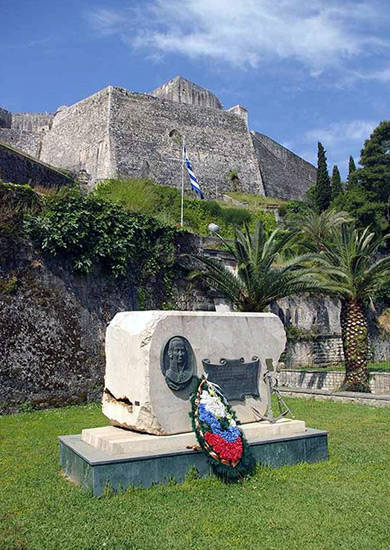
In addition, Russia and Turkey have gained invaluable experience of military-political cooperation. This experience later served as the basis for the development of the theory and practice of coalition strategy. Its relevance remains at the present time, both in the light of the solution of the Black Sea problem (the problem of the straits) and in the matter of maintaining stability throughout the region.
Research Institute (Military History)
Military Academy of the General Staff of the Armed Forces,
Candidate of Historical Sciences
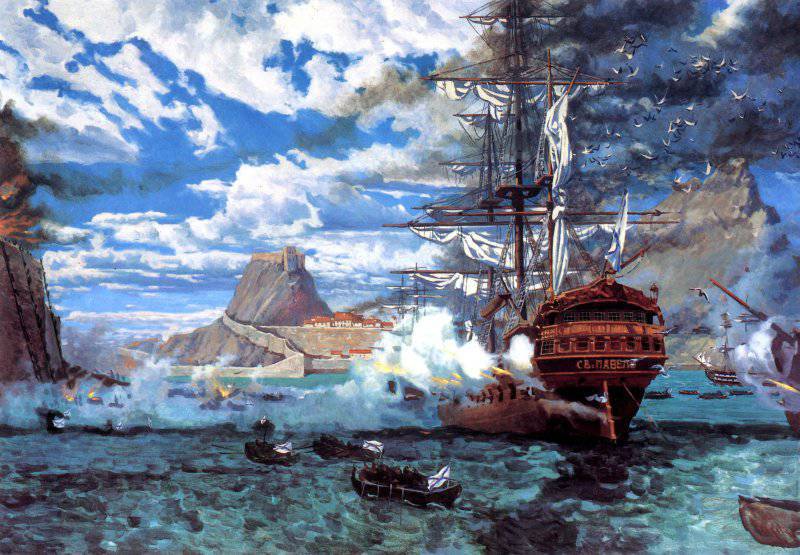
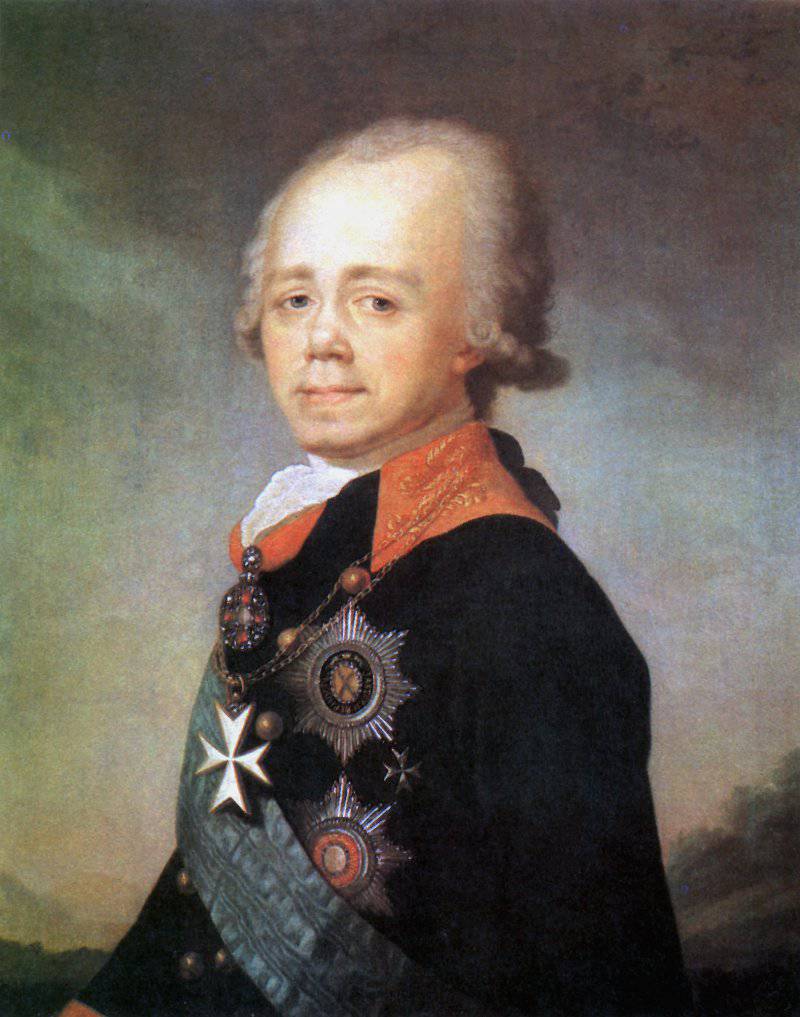
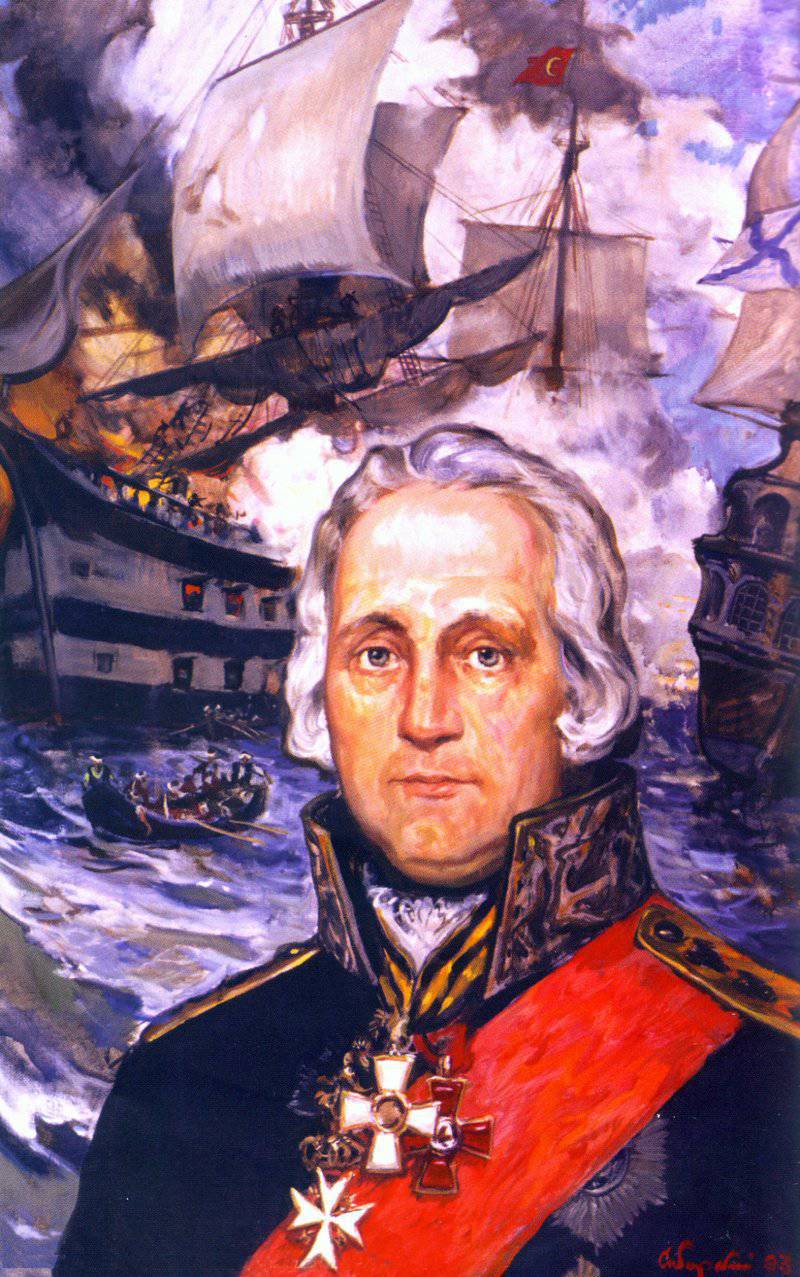
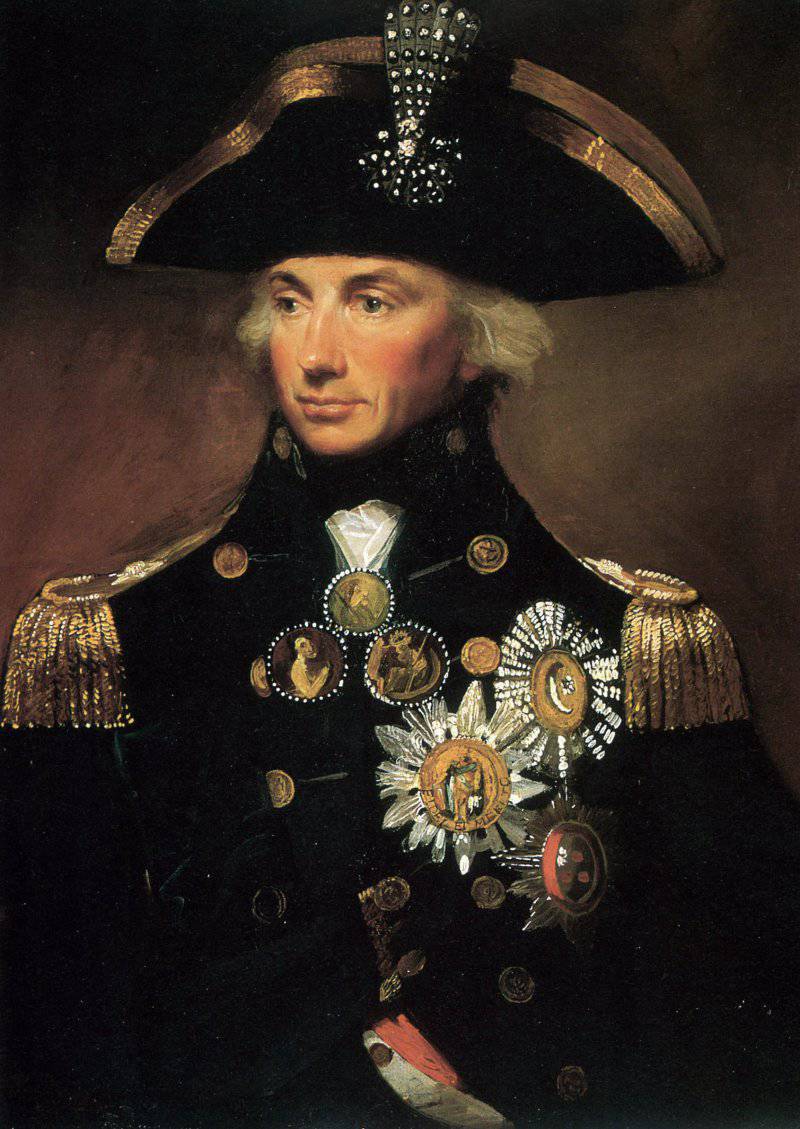
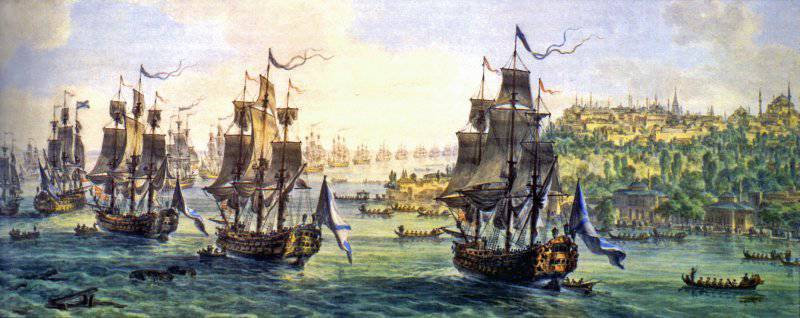
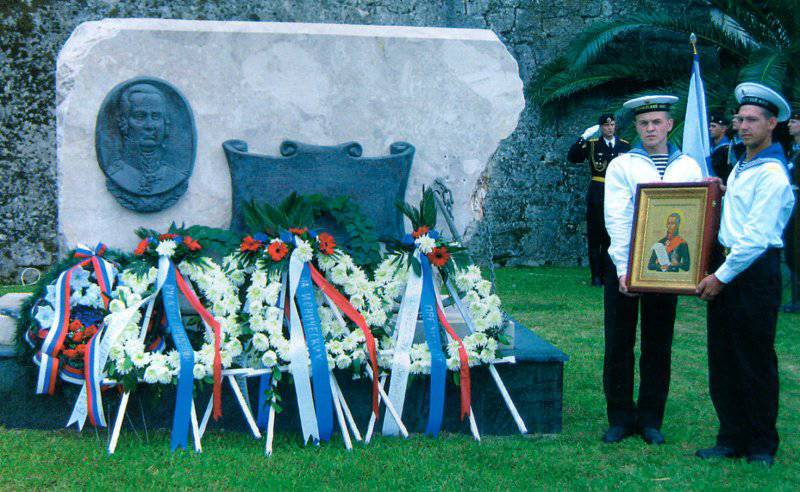
Information